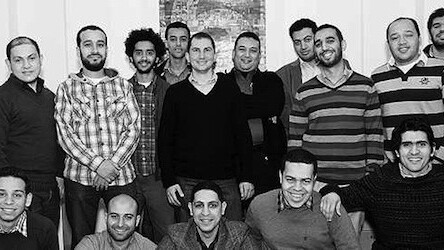
We took a look at Flat6Labs, a Cairo-based accelerator in October when it launched its first cycle with 5 startups under its wing. Fast forward 7 months later, and the accelerator is graduating its second cycle of startups.
 Founded by venture capital firm Sawari Ventures and the American University in Cairo, Flat6Labs offers applicants a typical accelerator experience – providing office space, mentoring and up to $12,000 in funding. In return, Flat6Labs gets a 10 to 15% stake of equity in the participating companies.
Founded by venture capital firm Sawari Ventures and the American University in Cairo, Flat6Labs offers applicants a typical accelerator experience – providing office space, mentoring and up to $12,000 in funding. In return, Flat6Labs gets a 10 to 15% stake of equity in the participating companies.
Flat6Labs’ second cycle graduated seven Egyptian startups in e-commerce, entertainment, education and social networking.
GyroLabs
 GyroLabs aims to bridge the gap between the traditional TV medium and the online world. Co-founded by Ahmed Fathalla and Hussein Khalifa, the startup is bringing smartphone applications that complement the TV viewing experience, a space which is relatively quiet in the Middle East.
GyroLabs aims to bridge the gap between the traditional TV medium and the online world. Co-founded by Ahmed Fathalla and Hussein Khalifa, the startup is bringing smartphone applications that complement the TV viewing experience, a space which is relatively quiet in the Middle East.
The GyroLabs app will give users additional information about what they’re watching, as well as add a social media experience to the TV-watching process, making it more interactive.
Looking at the full picture, the app is about more than just giving the end-user access to more content, but also gives broadcasters the chance to get targeted and tailored mobile content in the hands of their audience.
GyroLabs also has plans to partner with television manufacturers to bring their applications to SmartTVs.
Eshtery
 Founded by CEO Mohamed Shaaban, Eshtery bills itself as the first virtual store in Egypt. A mobile app available for the iPhone, Blackberry, Android and Nokia platforms, Eshtery is a QR code based mobile e-commerce platform.
Founded by CEO Mohamed Shaaban, Eshtery bills itself as the first virtual store in Egypt. A mobile app available for the iPhone, Blackberry, Android and Nokia platforms, Eshtery is a QR code based mobile e-commerce platform.
Following a model which we first saw in Korea, Eshtery makes QR codes publicly available, so users can scan the codes to purchase groceries, food, gifts etc, and have them delivered to them. The app currently offers products from Cairo-based group buying site Offerna and Triptanza.
AskNative
 AskNative, which comes to us courtesy of its CEO and founder Abdelmonem Ragab, aims to help the smartphone carrying traveler on the go.
AskNative, which comes to us courtesy of its CEO and founder Abdelmonem Ragab, aims to help the smartphone carrying traveler on the go.
The mobile application puts local knowledge in the traveler’s hands by crowdsourcing information from users all over the world. AskNative crowdsources information on travel and cultural knowledge, deals and offers by encouraging users all over the world to share that kind of information.
On the flip side, travelers can subscribe to users in their destination spots and find out more about what to expect, before they go, and after they get there.
2ogra
 With no governing body or managing company to speak of, the taxi industry in Egypt is plagued with issues – from safety, to convenience to inconsistent pricing.
With no governing body or managing company to speak of, the taxi industry in Egypt is plagued with issues – from safety, to convenience to inconsistent pricing.
2ogra is a new application which aims to dela with a few of those issues. Co-founded by Tamer Fathi and Edward Disley, 2ogra (which literally means ‘for hire’) aims to streamline the taxi service business both for drivers and passengers.
Using the 2ogra application, customers can request a taxi, and drivers can respond to these requests based on their proximity. 2ogra describes its core advantage as the “use of technology to facilitate the operation and reduce cost.”
Yadget
 Co-founded by Mohammed Sameer and Mohamed Kash, Yadget is a location-based social networking mobile application. Using Yadget, users will be able to tag objects and locations, share messages and notes or ‘yadgets’ with other users, with the choice of making them public or private.
Co-founded by Mohammed Sameer and Mohamed Kash, Yadget is a location-based social networking mobile application. Using Yadget, users will be able to tag objects and locations, share messages and notes or ‘yadgets’ with other users, with the choice of making them public or private.
A similar concept has been implemented by the likes of CircleMe, but Yadget sets itself apart by allowing users to follow objects, place and specific tags.
Crowdsway
 Crowdsway‘s cofounders Mohamed Alborno and Charles Gambey want to give people everywhere the chance to become filmmakers, with the use of a crowdsourcing platform. Crowdsway brings content creators and clients together, giving them a common ground to interact, acting as a social network for filmmakers.
Crowdsway‘s cofounders Mohamed Alborno and Charles Gambey want to give people everywhere the chance to become filmmakers, with the use of a crowdsourcing platform. Crowdsway brings content creators and clients together, giving them a common ground to interact, acting as a social network for filmmakers.
Crowdsway is offering a win-win solution – content creators can self-promote, companies and marketeers can look for talent on the site, and talented individuals can find paying freelance jobs.
Nafham
 Startup Nafham (literally ‘understand’), co-founded by Ahmed Alfi, Mostafa Farahat and Hashem Aly, will offer users educational video content based on the Egyptian public curriculum.
Startup Nafham (literally ‘understand’), co-founded by Ahmed Alfi, Mostafa Farahat and Hashem Aly, will offer users educational video content based on the Egyptian public curriculum.
The 10 to 15 minute videos will be reviewed by professionals, and will offer an alternative educational approach to the standards offered in Egyptian classrooms.
Categorized by grade, subject, topic and month, students will be able to easily find videos to complement and even enhance their existing educational system.
Nafham’s content will be aggregated from all over the Web, and curated by moderators. Missing lessons will then be crowdsourced from its public audience.
Get the TNW newsletter
Get the most important tech news in your inbox each week.




